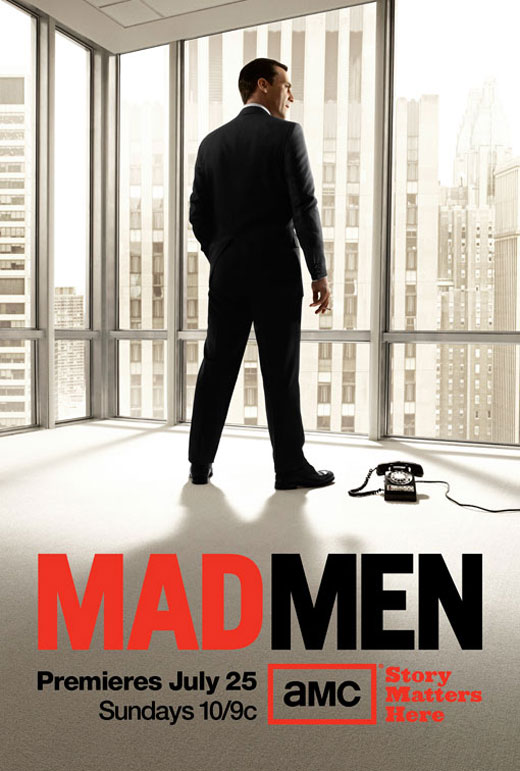
JAMES WOLCOTT: It’s 1964, LBJ is in the White House, America is on the marching move, the Beatles land at Idlewild and appear on Ed Sullivan–the cymbal clash that signals that the Sixties have truly begun, heralded by the simultaneous mass climax of millions of screaming girls whose joy and delirium explodes like a bomb from the depths of Pandora’s Box. The lid is off and it’s Pop goes the weasel for a whole generation. How satisfyingly smooth is Mad Men able to slip into its groove now, no longer obliged to tick off the mores and reference points of the Sixties as if checking off items from a sociology survey course for time-traveling tourists: liquor lapped up like water (check), cigarette smoke-stacks dangling from every set of lips and every pair of fingers (check), blatant ogling sexism in the workplace and Donna Reed domesticity at home (check), backward racial attitudes and casual anti-Semitism (“Ready to sweet-talk some retail Jews?” asks rookie Pete Campbell in the series premiere: check), closeted homosexuality (click), souls slowly, quietly suffocating from the pressing ceiling of conformity and the soft hands of Palmolive lotion (check), the ominous foreshadows of embroiling war in Southwest Asia (check), the gray infestation of TV light into every room (check, check, check, check, check). The orientation course has been completed, and the show can unfold without invisible captions affixed to the period items and self-conscious arrowing to every expression of political incorrectness now considered inappropriate in the faculty lounge and by Human Services. Success has laid a slick coating of confidence on every scene now that the characters are established and slide through their paces like cut-out dolls with tap-dancing dialogue. MORE
![]() FRESH AIR: The the third season of the AMC drama Mad Men ended in a spectacularly big way. Not only did protagonist Don Draper and some of his coworkers leave the advertising firm Sterling Cooper to form a new agency — Sterling Cooper Draper Pryce — but Don’s marriage to his wife Betty exploded after Don revealed that he isn’t who he said he was all along. Series creator Matthew Weiner tells Fresh Air‘s Terry Gross that he always intended to shake up Mad Men‘s plot — and in a big way. “From the beginning of the season last year, I said, ‘This year is really going to be about change.'” he says. “And I really felt, story-wise, well, this marriage is the crux of the series, and Don had this secret that he was keeping from everyone, including his wife — and that needed to come out.” On today’s Fresh Air, Weiner explains how he came up with the idea for the major plot shakeup and details his favorite moments from the series. Weiner — who is also Mad Men‘s head writer and an executive producer — was previously a writer for The Sopranos. He has received six Emmy Awards for his work on the two series.
FRESH AIR: The the third season of the AMC drama Mad Men ended in a spectacularly big way. Not only did protagonist Don Draper and some of his coworkers leave the advertising firm Sterling Cooper to form a new agency — Sterling Cooper Draper Pryce — but Don’s marriage to his wife Betty exploded after Don revealed that he isn’t who he said he was all along. Series creator Matthew Weiner tells Fresh Air‘s Terry Gross that he always intended to shake up Mad Men‘s plot — and in a big way. “From the beginning of the season last year, I said, ‘This year is really going to be about change.'” he says. “And I really felt, story-wise, well, this marriage is the crux of the series, and Don had this secret that he was keeping from everyone, including his wife — and that needed to come out.” On today’s Fresh Air, Weiner explains how he came up with the idea for the major plot shakeup and details his favorite moments from the series. Weiner — who is also Mad Men‘s head writer and an executive producer — was previously a writer for The Sopranos. He has received six Emmy Awards for his work on the two series.
